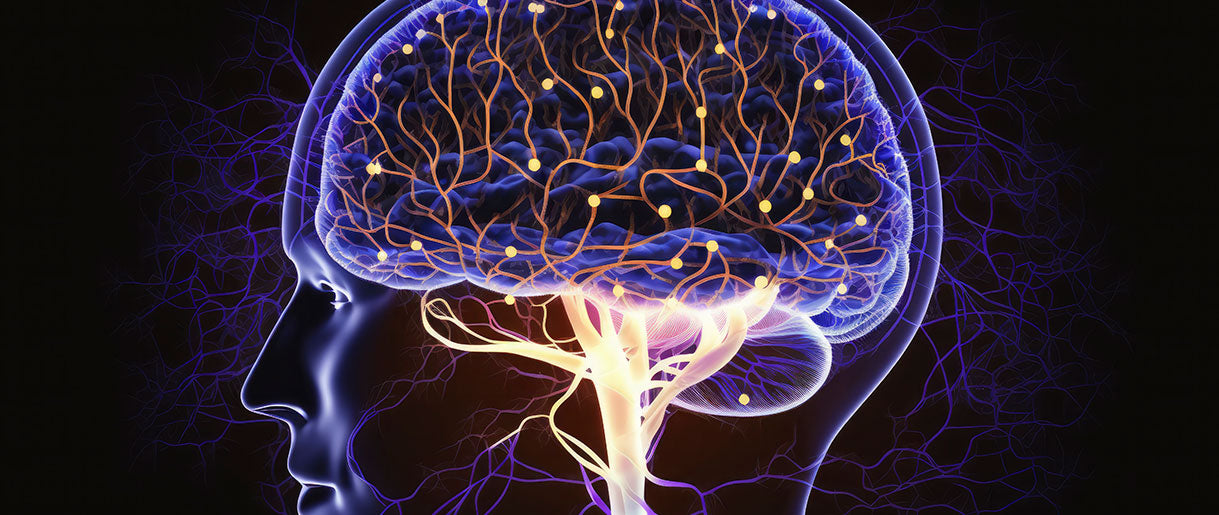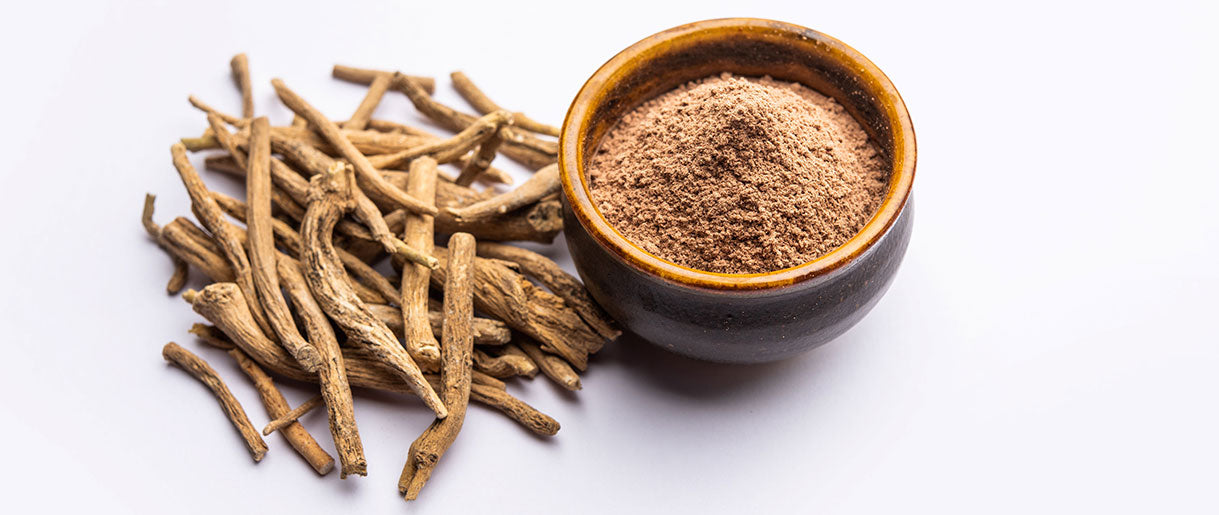1. Fights Stress
Ever felt like your brain is in a constant buzz of stress? Meet Ashwagandha, your natural ally in the battle against the stress monster.
Known as Withania Somnifera or Indian Ginseng, this herb doesn't just reduce stress; it transforms your mind's response to it.
Let's break down how this ancient remedy can help you keep your cool and sharpen your cognitive function:
- Cortisol Cutter: Think of Ashwagandha as your cortisol (1) bouncer. It tells stress hormones—cortisol, in this case—to take a hike, making room for calm and clarity.
- Mental Sharpener: By reducing stress, Ashwagandha doesn't just make you feel good; it actually enhances your cognitive function. Scientific evidence (2) backs this up, especially in healthy adults.
- Anxiety's Antidote: It's not just about stress; Ashwagandha is also a champ at dialing down anxiety symptoms. Hello, peace of mind!
- Chronic Stress Warrior: If you're battling the long-term grind, Ashwagandha helps build mental resilience. It's like a gym for your brain's stress response.
Incorporating the benefits of Ashwagandha into your life is like giving your brain a much-needed vacation.
It's not just about escaping stress; it's about redefining your mental health and cognitive function.
2. Enhances Memory

Have you ever wished for a memory boost, something to clear the fog and sharpen your recall? Enter Ashwagandha, also known as Withania Somnifera.
This ancient herb isn't just old folklore; it's a memory enhancer backed by science (3).
By fighting off free radicals with its antioxidant powers, Ashwagandha helps protect your nerve cells, paving the way for improved memory and cognitive function.
Ready to see how it can benefit your brain function and ameliorate cognitive dysfunction? Let's dive in:
- Antioxidant Superhero: Ashwagandha is like a shield for your brain cells, guarding them against the onslaught of harmful free radicals (4) and potential neurodegenerative disorders like Alzheimer's disease.
- Memory Enhancer: Forgetfulness doesn't stand a chance. Studies, including double-blind placebo-controlled clinical trials (5), show that Ashwagandha can significantly benefit cognitive function and working memory.
- Cognitive Function Champion: It's not just memory; Ashwagandha supports all-around cognitive performance. Whether learning something new or staying sharp, this herb has your back.
So, think of Ashwagandha as your brain's personal trainer, pushing you to remember more, think clearer, and perform better.
This herb could be your secret weapon whether studying, working, or just looking to stay mentally sharp.
3. Improves Concentration
Ever feel like your brain's in a fog, making it hard to focus and stay on task? Looking for ideal ways to focus better?
Ashwagandha steps up as your natural focus booster. Known for its stress-relieving properties, this herb doesn't just relax you; it sharpens your mind.
By dialing down stress and anxiety, Ashwagandha clears the way for improved concentration and cognitive functions.
- Stress Slayer: Ashwagandha is a pro at reducing stress, often the main culprit behind scattered thoughts and poor concentration.
- Cognitive Clarity: By modulating hippocampal glutathione biosynthesis and combating BPA-induced cognitive dysfunction, Ashwagandha supports significant improvements in mental clarity (6).
- Performance Enhancer: It's not just about mental tasks; Ashwagandha can also contribute to better physical and psychomotor performance, helping you stay sharp and coordinated.
Imagine sitting down to work or study and feeling a wave of calm, focused energy wash over you. That's Ashwagandha at work.
With its beneficial effects on brain health and cognitive function, this herb is like a secret weapon for anyone looking to boost their productivity and mental acuity.
4. Offers Neuroprotection

Concerned about your brain's health as you age? Turn to Ashwagandha, a distinguished Ayurvedic herb, renowned for its neuroprotective qualities.
This isn't just any supplement; it's a powerhouse packed with compounds poised to defend your brain against age-related wear and tear while improving your overall cognitive health.
Let's delve deeper into how Ashwagandha acts as a guardian for your gray matter:
- Combatting Neurodegenerative Diseases: Ashwagandha's magic lies in its ability to fend off neurodegenerative diseases (7). It boosts brain function by regenerating nerve cells and dendrites, leading to improved cognitive abilities and a lower risk of diseases like Alzheimer's and Parkinson's.
- Stress-Reducing Saponins: The saponins in Ashwagandha are powerful stress relievers. By reducing the detrimental effects of stress on the brain, these compounds help maintain cognitive health and protect against cognitive decline.
- Antioxidant Action: Ashwagandha is rich in antioxidants that protect the brain from free radical damage. This action helps preserve the health of brain cells and improve executive function, keeping your mind sharp and responsive.
By integrating Ashwagandha into your daily regimen, you're not just defending your brain against the inevitable march of time; you actively improve cognitive function and vitality.
This herb doesn't just slow cognitive decline; it promotes a vibrant, active mind capable of clear thinking and effective problem-solving.
5. Relieves Anxiety
Feeling like you're constantly in a battle with anxiety? Ashwagandha might just be the ally you're looking for.
Renowned for its anxiolytic effects (8), this herb has been shown to help reduce depression and anxiety symptoms by regulating the chemical signals in your nervous system.
One of the benefits of Ashwagandha for men and women is that it can help control cortisol production. By helping the body maintain healthy cortisol levels, this herb ensures that stress does not turn chronic or cause depression.
Incorporating Ashwagandha into your morning routine for mental health can be like a deep, calming breath for your nervous system.
It's not just about quelling the current anxiety; it's about equipping your body with the tools to handle future stressors more effectively.
6. Improves Sleep

Tossing and turning when you should be dreaming? Ashwagandha might just be the sleep guru you need.
This ancient herb enhances sleep quality and combats insomnia, setting the stage for improved cognitive performance and overall well-being.
- Soothing Sleep Enhancer: Ashwagandha works by soothing the nervous system, preparing your body for a restful night. It's not just about more sleep; it's about better-quality sleep.
- Insomnia's Natural Nemesis: Struggling with insomnia? Ashwagandha has been shown to help manage sleep disorders (9), gently coaxing your body into a natural sleep rhythm.
- Cognitive Performance Boost: Good sleep is the cornerstone of cognitive health. Ashwagandha improves focus, memory, and overall brain function by enhancing sleep quality.
Integrating Ashwagandha into your evening routine could be your first step towards a night of deeper, more restorative sleep.
Imagine closing your eyes and effortlessly drifting off to a place of tranquility and rest—that's one of the benefits of Ashwagandha for women and men.
7. Increases Resilience to Neurological Stress
In our fast-paced world, our brains are constantly bombarded with environmental toxins and stressors, both physical and mental. Ashwagandha offers a sanctuary, a way to bolster our brain's defenses against these relentless attacks.
- Environmental Toxin Defender: Ashwagandha protects against environmental toxins that can damage brain cells, helping preserve your neurological health.
- Stress Buffer: This herb isn't just about coping with stress; it's about building resistance. Ashwagandha helps your brain adapt and respond to stress more effectively, preventing the usual wear and tear of a high-stress lifestyle.
- Mental Fortitude Enhancer: Regular use of Ashwagandha can lead to a stronger, more resilient mind, capable of withstanding the mental stress that modern life throws our way.
- Physical Stress Alleviator: It's not just your mind that benefits. Ashwagandha supports your physical and mental health, helping you better manage physical stress and maintain peak performance.
Incorporating Ashwagandha into your daily regimen is like giving your brain a suit of armor against the onslaught of modern life.
By increasing your resilience to neurological stress, you're not just surviving; you're thriving, with a brain prepared to tackle whatever comes its way.
8. Has Anti-inflammatory Effects
Chronic inflammation is a silent adversary, lurking in the background and gradually undermining your brain health. Enter Ashwagandha, your botanical warrior equipped with potent anti-inflammatory properties.
This ancient herb doesn't just soothe inflammation; it shields your brain from the insidious damage it can cause.
- Inflammation Tamer: Ashwagandha contains compounds that actively reduce inflammation (10), helping to mitigate its harmful impact on brain cells and overall brain health.
- Brain Health Protector: By calming inflammation, Ashwagandha helps protect the brain from the slow, silent damage that can lead to cognitive decline and other neurological issues.
Incorporating Ashwagandha into your daily health routine is a proactive step towards safeguarding your brain's health and functionality. By combating inflammation, Ashwagandha protects your cognitive abilities and contributes to a healthier, more vibrant you.
9. Promotes Emotional Balance (Mood Boost)

Feeling the emotional rollercoaster a bit too intensely, or do you have a family member dealing with bipolar disorder? Ashwagandha might just be the stabilizer you need.
This powerful herb doesn't just support your physical and cognitive health; it's also a mood enhancer. Clinical research suggests that Ashwagandha can be a natural ally against mood swings and mild depression.
- Depression and Anxiety Symptom Relief: Ashwagandha has shown promise in alleviating symptoms associated with depression and anxiety. It regulates chemical signaling in the brain, offering a sense of calm and well-being.
- Stress-Related Disorders Shield: Perceived stress can lead to a cascade of emotional imbalances. Ashwagandha steps in as a shield, helping mitigate the effects of stress-related disorders and maintaining emotional equilibrium.
- Cognitive and Psychomotor Performance: It's not just about feeling better; it's about performing better, too. Ashwagandha supports cognitive and psychomotor performance, contributing to an overall sense of clarity and focus, which, in turn, positively affects your mood.
Incorporating Ashwagandha into your life is like giving your mind daily sunshine. By tackling the root causes of mood swings and depression—be it stress, cognitive imbalance, or a general sense of unease—Ashwagandha helps pave the way for a more joyful, serene you.
How to Use Ashwagandha for Brain Health

So, you're sold on the idea of Ashwagandha being your brain's wingman, but you're probably wondering, "How do I make the most of this herb?"
Fear not, my friend—incorporating Ashwagandha into your daily routine is easier than you might think!
First things first, let's talk dosage.
While there's no one-size-fits-all approach, most studies suggest that a daily dose of 300-500mg of high-quality Ashwagandha extract should do the trick.
But, as with any new supplement, it's always a good idea to start low and go slow. Begin with a lower dose and gradually work your way up to find your sweet spot.
Now, you might be thinking, "Do I have to choke down a handful of bitter herbs every day?"
Absolutely not!
Ashwagandha supplements come in many forms, from capsules and powders to tinctures and gummies.
So, whether you're a traditionalist who prefers the earthy taste of the powder stirred into your morning smoothie, or a modern health enthusiast who loves the convenience of a capsule, there's an Ashwagandha option for you.
But the best part? Ashwagandha isn't just a one-trick pony. To really give your brain the VIP treatment, consider pairing this herb with other brain-boosting strategies.
Get plenty of sleep, exercise regularly, and nourish your noggin with a diet rich in brain-friendly foods like fatty fish, berries, and nuts. With Ashwagandha as the cherry on top, you'll be well on your way to a happier, healthier, and sharper mind!
FAQs About Ashwagandha for Brain
Does Ashwagandha Clear Brain Fog?
Yes, Ashwagandha is known to help clear brain fog.
It does this by reducing stress, balancing cortisol levels, and improving cognitive function and mental clarity, making it a beneficial supplement for those looking to enhance focus and mental acuity.
However, individual experiences may vary, and it's always wise to consult with a healthcare professional before starting any new supplement.
Can Ashwagandha Help With ADHD?
Yes, Ashwagandha can be used in ADHD in addition to standard treatment.
There are a few postulates for the cause of ADHD, which include environmental exposure to toxins, brain injury, and genetic defects.
Ashwagandha has antioxidant properties that scavenge toxins and help regenerate injured brain cells. Besides, it improves attention and concentration problems seen in ADHD patients.
How Long Does It Take Ashwagandha To Work?
It varies from person to person. In some people, the effect is seen immediately, while a subtle effect can be seen within a month in other people.
Positive effects can be seen as early as four weeks. Some people may take two to three months to see the effects. The safety of this herb beyond three months of use has not been studied to date, so its effect beyond three months of use is not known.
Key Takeaways
As we've journeyed through the myriad benefits of Ashwagandha for brain health, it's clear that this ancient herb is more than just a supplement; it's a multifaceted elixir designed to enhance your life in numerous ways.
From combating stress and anxiety to improving sleep, boosting cognitive function, and protecting against inflammation, Ashwagandha stands out as a natural and powerful ally in your quest for better health and well-being.
Remember, the path to health is personal and unique to each individual. While Ashwagandha offers various benefits, it's crucial to consider your health circumstances and consult a healthcare professional before introducing any new supplement into your routine. They can provide personalized advice and ensure that Ashwagandha is the right choice.
Now, we turn the page over to you. Have you experienced the benefits of Ashwagandha in your life, or are you considering trying it? Do you have questions, stories, or insights to share?
Your journey, experiences, and curiosity can inspire and inform others. So, let's keep the conversation going. Leave a comment below with your thoughts, experiences, or questions about Ashwagandha.
References
- An investigation into the stress-relieving and pharmacological actions of an ashwagandha (Withania somnifera) extract, (1), https://www.ncbi.nlm.nih.gov/pmc/articles/PMC6750292/
- A Prospective, Randomized Double-Blind, Placebo-Controlled Study of Safety and Efficacy of a High-Concentration Full-Spectrum Extract of Ashwagandha Root in Reducing Stress and Anxiety in Adults, (2), https://www.ncbi.nlm.nih.gov/pmc/articles/PMC3573577/
- Effects of Acute Ashwagandha Ingestion on Cognitive Function, (3), https://www.ncbi.nlm.nih.gov/pmc/articles/PMC9565281/
- Ashwagandha (Withania somnifera)—Current Research on the Health-Promoting Activities: A Narrative Review, (4), https://www.ncbi.nlm.nih.gov/pmc/articles/PMC10147008/
- Efficacy and Safety of Ashwagandha Root Extract on Cognitive Functions in Healthy, Stressed Adults: A Randomized, Double-Blind, Placebo-Controlled Study, (5), https://www.ncbi.nlm.nih.gov/pmc/articles/PMC8632422/
- The Perceived Impact of Ashwagandha on Stress, Sleep Quality, Energy, and Mental Clarity for College Students: Qualitative Analysis of a Double-Blind Randomized Control Trial, (6), https://pubmed.ncbi.nlm.nih.gov/35984870/
- Neurodegenerative diseases and Withania somnifera (L.): An update, (7), https://pubmed.ncbi.nlm.nih.gov/32240781/
- Adaptogenic and Anxiolytic Effects of Ashwagandha Root Extract in Healthy Adults: A Double-blind, Randomized, Placebo-controlled Clinical Study, (8), https://www.ncbi.nlm.nih.gov/pmc/articles/PMC6979308/
- Clinical evaluation of the pharmacological impact of ashwagandha root extract on sleep in healthy volunteers and insomnia patients: A double-blind, randomized, parallel-group, placebo-controlled study, (9), https://pubmed.ncbi.nlm.nih.gov/32818573/
- Ashwagandha root extract exerts anti‑inflammatory effects in HaCaT cells by inhibiting the MAPK/NF‑κB pathways and by regulating cytokines, (10), https://pubmed.ncbi.nlm.nih.gov/29620265/










Let Us Know Your Comments